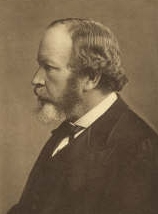
Volume 36 - Autumn 2013
Enemies of Books - Part 11 - Postscriptum
by William Blades

Originally
Published as a serial in 1879 in the August, September and October editions
of the 'Printer's Register'
-"A monthly serial devoted to the interests of printers generally"
First published as a book, with revisions and additions in 1880
Originally Published as a serial in 1879 in the August, September and October editions of the 'Printer's Register', "A monthly serial devoted to the interests of printers generally"
First published as a book, with revisions and additions in 1880
ALTHOUGH, strictly speaking, the following anecdote does not illustrate any form of real injury to books, it is so racy, and in these days of extravagant biddings so tantalizing, that I must step just outside the strict line of pertinence in order to place it on record, It was sent to me, as a personal experience, by my friend, Mr. George Clulow, a well-known bibliophile, and "Xylographer" to "Ye Sette of ye Odde Volumes." The date is 1881. He writes:
"Apropos of the Gainsborough `find,' of which you tell in `The Enemies of Books,' I should like to narrate an experience of my own, of some twenty years ago:
"Late one evening, at my father's house, I saw a catalogue of a sale of furniture, farm implements and books, which was announced to take place on the following morning at a country rectory in Derbyshire, some four miles from the nearest railway station.
"It was summer time--the country at its best--and with the attraction of an old book, I decided on a day's holiday, and eight o'clock the next morning found me in the train for C----, and after a variation in my programme, caused by my having walked three miles west before I discovered that my destination was three miles east of the railway station, I arrived at the rectory at noon, and found assembled some thirty or forty of the neighbouring farmers, their wives, men-servants and maid-servants, all seemingly bent on a day's idling, rather than business. The sale was announced for noon, but it was an hour later before the auctioneer put in an appearance, and the first operation in which he took part, and in which he invited my assistance, was to make a hearty meal of bread and cheese and beer in the rectory kitchen. This over, the business of the day began by a sundry collection of pots, pans, and kettles being brought to the competition of the public, followed by some lots of bedding, etc. The catalogue gave books as the first part of the sale, and, as three o'clock was reached, my patience was gone, and I protested to the auctioneer against his not selling in accordance with his catalogue. To this he replied that there was not time enough, and that he would sell the books to-morrow! This was too much for me, and I suggested that he had broken faith with the buyers, and had brought me to C---- on a false pretence. This, however, did not seem to disturb his good humour, or to make him unhappy, and his answer was to call `Bill,' who was acting as porter, and to tell him to give the gentleman the key of the `book room,' and to bring down any of the books he might pick out, and he `would sell 'em.' I followed `Bill,' and soon found myself in a charming nook of a library, full of books, mostly old divinity, but with a large number of the best miscellaneous literature of the sixteenth century, English and foreign. A very short look over the shelves produced some thirty Black Letter books, three or four illuminated missals, and some book rarities of a more recent date. `Bill' took them downstairs, and I wondered what would happen! I was not long in doubt, for book by book, and in lots of two and three, my selection was knocked down in rapid succession, at prices varying from 1s. 6d. to 3s. 6d., this latter sum seeming to be the utmost limit to the speculative turn of my competitors. The bonne bouche of the lot was, however, kept back by the auctioneer, because, as he said, it was 'a pretty book,' and I began to respect his critical judgment, for `a pretty book' it was, being a large paper copy of Dibdin's Bibliographical Decameron, three volumes, in the original binding. Suffice it to say that, including this charming book, my purchases did not amount to L13, and I had pretty well a cart-load of books for my money--more than I wanted much! Having brought them home, I `weeded them out,' and the `weeding' realised four times what I gave for the whole, leaving me with some real book treasures.
"Some weeks afterwards I heard that the remainder of the books were literally treated as waste lumber, and carted off to the neighbouring town, and were to be had, any one of them, for sixpence, from a cobbler who had allowed his shop to be used as a store house for them. The news of their being there reached the ears of an old bookseller in one of the large towns, and he, I think, cleared out the lot. So curious an instance of the most total ignorance on the part of the sellers, and I may add on the part of the possible buyers also, I think is worth noting."
How would the reader in this Year of Grace, 1887, like such an experience as that?
CONCLUSION.
IT is a great pity that there should be so many distinct enemies at work for the destruction of literature, and that they should so often be allowed to work out their sad end. Looked at rightly, the possession of any old book is a sacred trust, which a conscientious owner or guardian would as soon think of ignoring as a parent would of neglecting his child. An old book, whatever its subject or internal merits, is truly a portion of the national history; we may imitate it and print it in fac-simile, but we can never exactly reproduce it; and as an historical document it should be carefully preserved.
I do not envy any man that absence of sentiment which makes some people careless of the memorials of their ancestors, and whose blood can be warmed up only by talking of horses or the price of hops. To them solitude means 'ennui', and anybody's company is preferable to their own. What an immense amount of calm enjoyment and mental renovation do such men miss. Even a millionaire will ease his toils, lengthen his life, and add a hundred per cent. to his daily pleasures if he becomes a bibliophile; while to the man of business with a taste for books, who through the day has struggled in the battle of life with all its irritating rebuffs and anxieties, what a blessed season of pleasurable repose opens upon him as he enters his sanctum, where every article wafts to him a welcome, and every book is a personal friend!
With grateful thanks to Mark Corder, John Gardner and Ursula Jeffries
William Blades - printer and bibliographer was born in Clapham, London on the 5th December 1824. In 1840 he was apprenticed to his father's printing business in London and was subsequently taken into partnership. The firm was afterwards known as Blades, East & Blades. His interest in printing led him to make a study of the volumes produced by Caxton's press, and of the early history of printing in England. His Life and Typography of William Caxton, England's First Printer, was published in 1861-1863, and the conclusions which he set forth were arrived at by a careful examination of types in the early books, each class of type being traced from its first use to the time when, spoilt by wear, it passed out of Caxton's hands. Some 450 volumes from the Caxton Press were thus carefully compared and classified in chronological order. In 1877 Blades took an active part in organizing the Caxton celebration, and strongly supported the foundation of the Library Association. He was a keen collector of old books, prints and medals. His publications relate chiefly to the early history of printing, the Enemies of Books, his most popular work, being produced in 1881. He died at Sutton in Surrey on April 27, 1890
